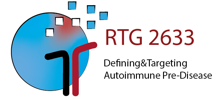MD B1: Testing the effect of kinase inhibitors in the human skin organ culture model for pemphigus vulgaris
Pemphigus vulgaris (PV) is an IgG-mediated autoimmune disease of stratified squamous epithelia, such as the skin and oral mucosa. IgG autoantibodies are raised against cell-cell adhesion molecules found in desmosomes. The characteristic autoantibodies are desmoglein 1 and desmoglein 3. The pathophysiological effect of these antibodies causes the keratinocytes to separate, a process called acantholysis, resulting in intraepithelial split formation. Subsequently, the clinical picture of the disease predominantly manifests in blistering of the skin and/or the mucous membranes, erosion formation, bleeding and dysphagia. The mainstay of the treatment is based on general immunosuppression: The systemic administration of steroids and latterly monoclonal antibodies, show severe side effects. Hence, further understanding of the fundamental pathogenesis of PV is essential to identify and test more precise treatment options for the disease. My project aims to further identify the role of kinases in intracellular signalling cascades in PV. Therefore, I investigate the dose-dependent effects of seven kinase inhibitors on the development of acantholysis. The experimentally induced PV skin specimens are prepared and harvested within the scope of the human skin organ culture model, previously established within the Hundt lab (Imke Burmester et al., 2019). The model mimics the intraepidermal split formation of PV by injecting a single chain variable fragment. The overall aim is to determine, whether and if so at which concentration effectively, the kinase inhibitors successfully minimize acantholysis compared to the controls. The skin samples are further assessed histologically to quantify the effect.

- Projects
- 1st Generation
- A: Defining Autoimmune Pre-Disease
- B: Targeting of Autoimmune Pre-Disease
- Associated projects
- Medical doctoral researcher projects
- Concluded projects
- Doctoral researchers
- Medical doctoral researchers
- MD A1: Investigation of the influence of specific CDK inhibitors on neutrophil activation
- MD A2: Anatomical expression of target antigens in autoimmune blistering dermatoses as markers for lesion formation
- MD A3: Structural characterization of skin-directed autoantibodies and their interaction with the antigen to gain insights into autoimmune pre-disease
- MD A4: Do interactions between AT1R autoantibodies derived from patients with systemic sclerosis and endothelial cells lead to endothelial dysfunction?
- MD A5: Establishing a human 3D skin model for pemphigus vulgaris
- MD A6: Assessing vasculopathy in systemic sclerosis using optical coherence tomography
- MD A7: Identification of autoantibodies contributing to the break of immunotolerance in immunization induced mucous membrane pemphigus mouse model
- MD A8: Impact of angiotensin II type 1 receptor antibodies on endothelial dysfunction in systemic sclerosis
- MD A9: Impact of glycosylation on IgG4-induced signaling in neutrophils
- MD A10: Testing a new single chain variable fragment for pemphigus foliaceus in the human skin organ culture model
- MD A11: Impact of glycosylation on IgG3-induced signaling in neutrophiles
- MD A12: Screening for inhibitors to prevent keratinocyte dissociation
- MD A13: Investigation of the local and systemic complement activation in bullous pemphigoid patients
- MD A14: Impact of different IgG subclasses and glycosylation patterns on immune complex-induced signaling in neutrophils
- MD A15: Novel target antigens of the lower basal membrane zone as inducers of autoimmunity of bullous autoimmune dermatoses
- MD A16: Identification of the major epitope of the BP180 ectodomain recognized by serum IgA autoantibodies of patients with pemphigoid diseases – IgA autoantibodies as prognostic marker?
- MD A17: Autoantibody-mediated effects on endothelial and immune cell signaling in systemic sclerosis
- MD A18: Molecular and cellular characterization of pre-autoimmune effects induced by aging in mice
- MD A19: Immunogenic effects of Staphylococcus aureus toxins in autoimmune vasculitis
- MD B1: Testing the effect of kinase inhibitors in the human skin organ culture model for pemphigus vulgaris
- MD B2: Investigation of cigarette smoking-induced autoantibodies against human airway epithelial cells in patients with chronic obstructive lung disease
- MD B3: Contribution of taurine, pyridoxine and pantothenic acid to the pathomechanism of pemphigus vulgaris
- MD B4: The influence of prednisolone treatment on split formation in the human skin organ culture model for pemphigus vulgaris
- MD B5: Molecular characterization of the pre-autoimmune effects of Western diet in healthy mice
- MD B6: Testing established MAP kinase inhibitors in a different approach of the human skin organ culture model for pemphigus vulgaris
- MD B7: Testing the effect of kinase inhibitors in the human skin organ culture model for pemphigus foliaceus
- Ass. doctoral researchers
- Ass. medical doctoral researchers
- 2nd Generation
- 1st Generation






